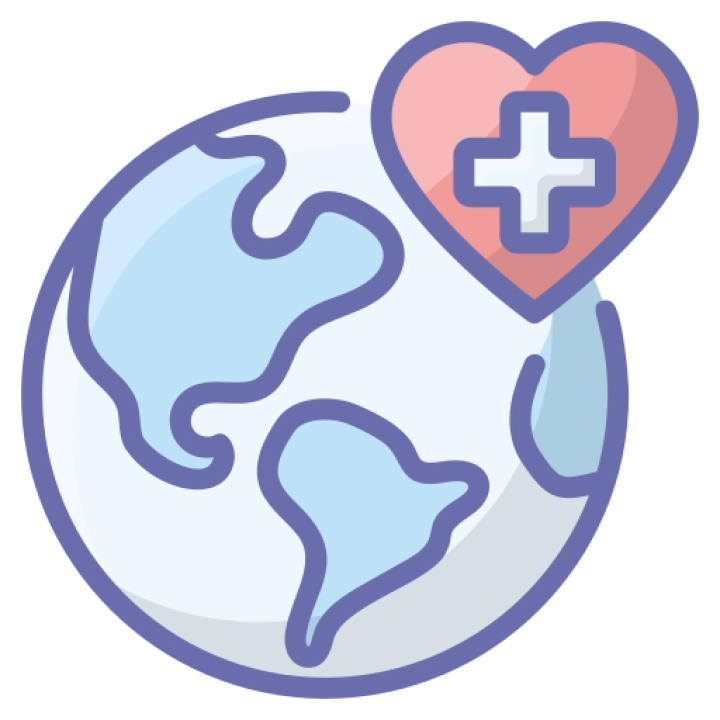College: Graduate Programs Institute
This specialization focuses on studying health issues and healthcare systems on a global scale. Students explore key areas such as epidemiology, health policy, global health systems, infectious diseases, and health disparities. The program emphasizes interdisciplinary knowledge, research methodologies, and understanding the cultural, social, and economic factors affecting health. Graduates are prepared for careers in public health, international organizations, NGOs, and healthcare policy.
Learning Objectives:
- Understand the fundamentals of global health and epidemiology.
- Develop skills in analyzing health policy, global health systems, and managing infectious diseases.
- Learn techniques for conducting global health research and analyzing health data.
- Explore the cultural, social, and economic factors affecting global health.
- Understand the role of international organizations and NGOs in global health.
- Analyze challenges and opportunities in global health policy and practice.
- Develop teamwork skills and problem-solving for global health projects and initiatives.
Main Outline:
- Introduction to Global Health
- Overview of global health, basic concepts, and historical context.
- Fundamentals of epidemiology and global health systems.
- Epidemiology
- Principles of epidemiology, including disease monitoring, outbreak investigation, and statistical analysis.
- Techniques for conducting epidemiological studies and analyzing health data.
- Health Policy and Systems
- Basics of health policy, including policy analysis, healthcare financing, and health system strengthening.
- Techniques for evaluating and influencing health policies and systems.
- Infectious Diseases
- Principles of infectious diseases, including epidemiology, prevention, and control.
- Techniques for managing and controlling infectious disease outbreaks.
- Health Disparities
- Exploring health disparities, including social determinants of health, health equity, and at-risk populations.
- Techniques for addressing health disparities and promoting health equity.
- Research Methods in Global Health
- Principles of research methods, including study design, data collection, and analysis.
- Techniques for conducting and evaluating global health research.
- Cultural, Social, and Economic Factors in Global Health
- Exploring cultural, social, and economic factors affecting global health.
- Techniques for addressing these factors in global health policy and practice.
- International Organizations and NGOs in Health
- The role of international organizations and NGOs in global health, including their tasks, activities, and impact.
- Techniques for collaborating with international organizations and NGOs in global health initiatives.
- Practical Training in Global Health
- Practical experiences in global health environments, including observations, internships, and practical projects.
- Techniques for applying acquired skills in practical global health environments.
- Capstone Project in Global Health
- A comprehensive project to apply acquired skills in epidemiology, health policy, or infectious disease management.
- Techniques for presenting a polished and impactful global health project.
Assessment Methods:
- Epidemiological studies, health policy analyses, infectious disease management plans, health disparity projects, research methodology papers, cultural and economic factor analyses, practical training reports, capstone projects, group projects, and internships.
Recommended Textbooks:
- "Global Health 101" by Richard Skolnik.
- "Population Health Science: Epidemiology and Global Health" by Katherine M. Keyes and Sandro Galea.
- "Policy & Politics in Nursing and Health Care" by Diana J. Mason et al.
- "Infectious Diseases: A Clinical Short Course" by Michael R. Wilson et al.
- "Research Methods in Global Health" by various authors.
Prerequisites:
Basic knowledge in public health, epidemiology, and social sciences. Suitable for students interested in global health, public health, and healthcare policy.
Duration:
Typically 4 years to earn a bachelor's degree, including coursework, projects, practical training, and internships.
Certification:
Graduates can earn a degree in global health and pursue professional certifications in public health, epidemiology, or healthcare policy.
Target Audience:
Aspiring global health specialists, public health professionals, healthcare policy analysts, and individuals seeking to work in international organizations, NGOs, and healthcare policy. This specialization equips students with the interdisciplinary, research, and practical skills needed to excel in global health, supporting careers in public health, international organizations, NGOs, and healthcare policy.

